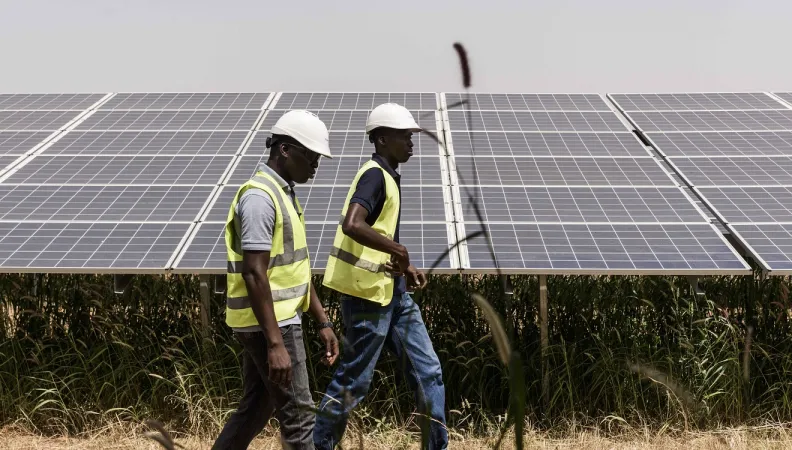Share the page
Improving Access to Energy in Africa with Digital Innovation
Published on

Half of the households in Sub-Saharan Africa lack access to electricity. One answer may lie in energy innovations. The Digital Energy Facility promotes digital innovation by start-ups and operators in the energy sector. Financed by the European Union and implemented by AFD, the program includes technical assistance, seed funding and calls for projects.
Being deprived of access to electricity has an impact on people’s daily lives, their health and education. It also affects economic competitiveness and hinders the development of the most fragile countries.
How to improve access to energy and provide everyone with reliable and available energy in sufficient quantities? This continues to be a fundamental issue, especially in Sub-Saharan Africa where, according to the World Bank, 53% of people still do not have access to it.
In the G5 Sahel countries – Burkina Faso, Chad, Mali, Mauritania and Niger – three quarters of the population live without electricity and use alternatives, such as kerosene and dry batteries, for needs as simple as lighting. Elsewhere, the volume of electricity distributed remains insufficient and unstable, which causes frequent power cuts.
Supporting stakeholders in the energy transition
The Digital Energy Facility (DEF) program is financed by the European Union and implemented by AFD. It aims to reduce this energy divide by supporting innovative start-ups and energy operators responsible for the production, transportation and distribution of electricity and gas.
“Digitalization improves the reliability of grids and reduces the cost of access to electricity,” says Jean-Pierre Barral, AFD’s Director of the Energy and Digital Transitions Department.
This program finances digital innovation projects in the energy sector in all the countries eligible for Official Development Assistance, except those in the pre-accession process for European Union membership.
The DEF program promotes the integration of renewable energy sources into grids and increases the rate of access. It also improves the performance of companies in the energy sector and reduces their technical and commercial losses.
Improved access to electricity for a million people
DEF finances assistance in the installation of smart grids and provides new digital solutions for energy generation and distribution. This technological progress also allows operators to improve their performance and diversify their range of services, while increasing access to reliable, clean and low-carbon energy services.
By 2023, the €23.5 million of financing allocated will contribute to increasing access to electricity for a million people. It will also finance the installation of 100 MW of additional power generation capacity from renewable energy sources and reduce annual CO2 emissions by 100,000 teq. At the end of the program, 50 public power utilities and operators are expected to have benefited from this support.
Call for projects to support and rally digital businesses
In addition to energy operators, the DEF program also focuses on start-ups. “DEF promotes and encourages partnerships between power utilities and start-ups operating in the field of digital innovation,” says Jean-Pierre Barral.
How? Through the Digital Energy Challenge, an annual call for projects that allows public companies responsible for the implementation of the energy transition to partner with small and medium-sized digital businesses.
Another instrument offered by the facility involves €300,000 to €400,000 of support for companies that develop access solutions in partnership with a financial institution specialized in seed funding. “We want to give stakeholders in the energy transition the possibility of scaling up by targeting innovative solutions that can be deployed by public power utilities,” says Cyril Renault, an energy economist at AFD. “DEF also supports and advises several public entities responsible for large-scale projects and the energy transition.”
Open data resources
The final driver of the action program involves collecting and sharing open data resources via a dedicated online platform for all energy sector operators. “The knowledge gained through the program’s financing needs to be shared and easily accessible,” says Cyril Renault. Such a platform will be set up this fall, to allow for networking, for example, through online workshops and B2B events.
This program thereby offers a wide range of instruments to support energy operators in their digitalization processes and establish partnerships between public services and the private sector.
The content of this publication is the sole responsibility of AFD and does not necessarily reflect the opinions of the European Union.
